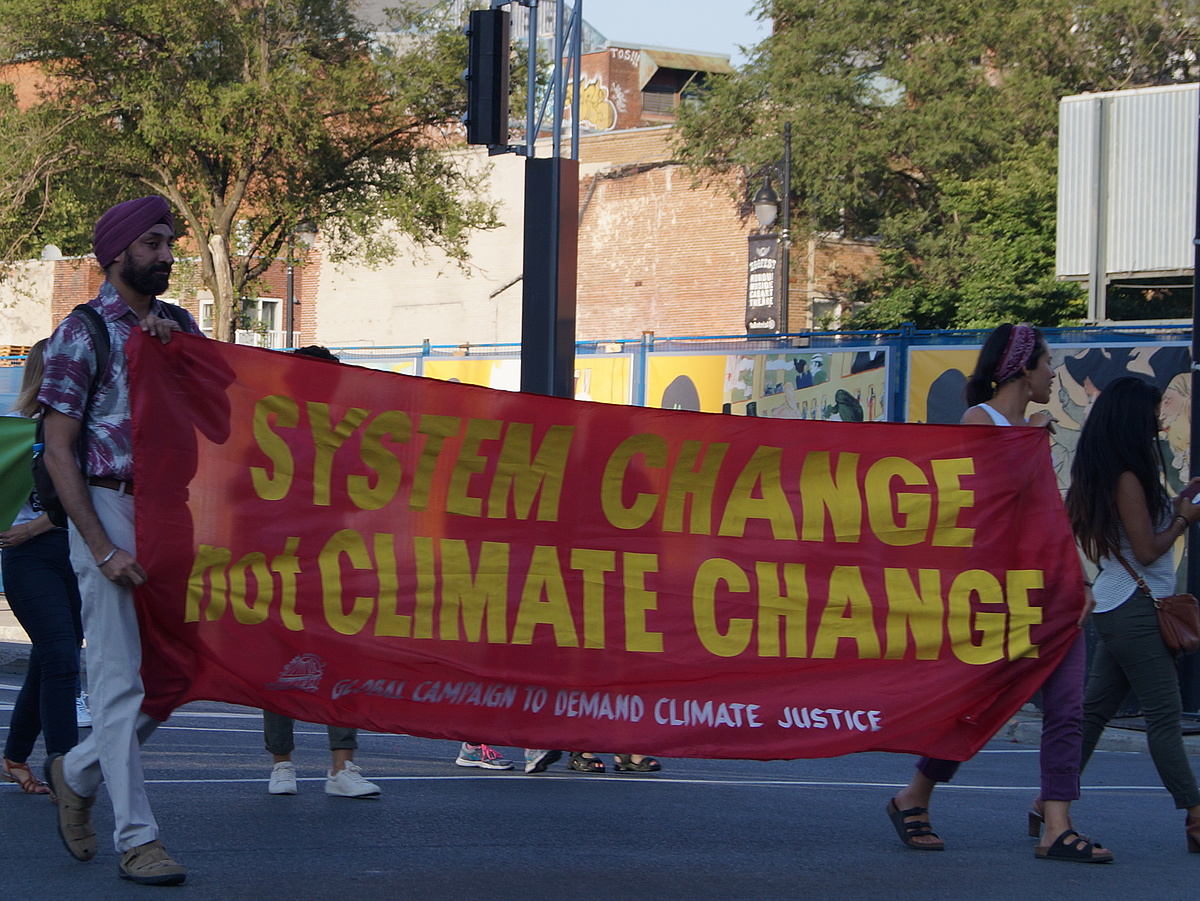Internationale Energie- und Klimapolitik

Nachhaltigkeit und soziale Gerechtigkeit zusammendenken
Der Klimawandel gehört zu den größten Herausforderungen des 21. Jahrhunderts. Er bedroht weltweit nicht nur die natürlichen Lebensgrundlagen, sondern auch die wirtschaftliche und soziale Entwicklung in vielen Ländern sowie grundlegende Menschenrechte wie das Recht auf Nahrung, Wasser, Gesundheit oder angemessenes Wohnen. Gerade die Länder des Globalen Südens, die am wenigsten zu den CO2-Emissionen beitragen, sind von den negativen Auswirkungen des Klimawandels besonders betroffen – aufgrund ihrer geographischen Lage, mangelnder Infrastruktur, unzureichender Anpassungskapazitäten, Armut und schwacher Institutionen.
Das Klimaabkommen von Paris und die Agenda 2030 für nachhaltige Entwicklung machen deutlich, dass bis Mitte des Jahrhunderts Treibhausgasneutralität erreicht werden muss, um die schädliche Erderwärmung zu begrenzen. Dafür bedarf es einer globalen Energietransformation weg von fossilen, emissionsintensiven, hin zu nachhaltigen, erneuerbaren Energiequellen. Dieser Strukturwandel muss sozial inklusiv und gerecht gestaltet werden.
Wir unterstützen solch eine sozial-ökologische Transformation. Unsere Partner aus Politik, Gewerkschaft und Zivilgesellschaft bestärken wir darin, dass Gerechtigkeit und Solidarität auch in der internationalen Energie- und Klimapolitik wichtige Handlungsprinzipien sind. Im Vordergrund steht für uns, dass Stimmen aus dem Globalen Süden in den Debatten über nachhaltige Wirtschaftsformen, die Gestaltung globaler Energietransformationswege, Klimagerechtigkeit und eine gerechte Weiterentwicklung der internationalen Klimapolitik gehört und berücksichtigt werden.
alle Neuigkeiten zum Thema "Internationale Energie- und Klimapolitik"
Berichte und Hintergründe zu COP 23, der Weltklimakonferenz 2017 in Bonn
- Weltweit
Klimakoordination
Lateinamerika & Karibik
Christian Denzin
c.denzin(at)fesmex.org
FES TransformaciónAsien
Yvonne Blos
yvonne.blos(at)fes-vietnam.org
FES VietnamMittlerer Osten & Nordafrika
Franziska Wehinger
Franziska.wehinger(at)fes-jordan.org
FES JordanienAfrika
Marcus Schneider
marcus.schneider(at)fes-madagascar.org
FES Madagascar
Unsere Schwerpunkte

Internationale Klimapolitik gerecht gestalten
Das Pariser Klimaabkommen sieht vor, dass die globale Erderwärmung auf unter zwei Grad begrenzt werden muss. Dazu sind massive Anstrengungen aller Staaten notwendig.
Wir setzen uns dafür ein, dass die internationale Klimapolitik auf der Basis der Menschenrechte gerecht und inklusiv gestaltet wird. Dazu engagieren wir uns im Umfeld von Klimaverhandlungen etwa durch Veranstaltungen und, indem wir unseren Partner aus Zivilgesellschaft und Gewerkschaften aus aller Welt eine Teilnahme ermöglichen. So wollen wir beitragen zur klima- und energiepolitischen Weiterbildung, zur gegenseitigen Vernetzung und zur Allianzenbildung. Auch Fragen von klimabedingter Migration und Flucht thematisieren wir in unseren Programmen.

Globale Energietransformation
Wir setzen uns für eine nachhaltige globale Energietransformation ein und unterstützen den Übergang zu kohlenstoffarmen Energiequellen. Besonders wichtig ist dabei für uns, gerechte Übergänge (just transition) für Arbeiter_innen in den fossilen Industrien zu schaffen. Weltweit wollen wir einen Beitrag zur Beendigung von Energiearmut, zur Verbesserung von Energieeffizienz und zu einem verantwortungsvollen Umgang mit Energie leisten, wie z.B. mit unseren Projekten zu „Low Carbon Development Pathways“ und zu den Voraussetzungen einer globalen Energiewende.

Postwachstum und ein gutes Leben für alle
Die akuten Klima-, Umwelt-, Wirtschafts- und Gerechtigkeitskrisen machen deutlich, dass ein Wirtschaften im alten Stil, das heißt auf der Basis der Ausbeutung endlicher Ressourcen, nicht weiter möglich ist. Wir setzen uns deshalb für den Aufbau nachhaltiger, d.h. emissionsarmer, ressourcenschonender und sozial inklusiver Wirtschaftssysteme ein. Zusammen mit unseren Partnern diskutieren wir Alternativen zum herkömmlichen Wirtschafts- und Entwicklungsmodell und fragen nach den Bedingungen für ein gutes Leben für alle Menschen.
Aktuelle Beiträge
Publikationen zum Thema
Guiding principles & lessons learnt for a just energy transition in the Global South
Berlin
Publikation herunterladen (11 MB, PDF-File)
Conca, Ken; Thwaites, Joe; Lee, Goueun
Climate change and global security
New York
Publikation herunterladen (140 KB, PDF-File)
Mehta, Udai S.; Bose, Pratim; Swain, Ashwini K.
In pursuit of a low fossil energy future
New Delhi
Publikation herunterladen (360 KB, PDF-File)






